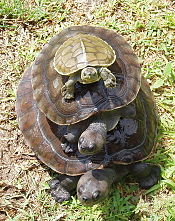Black-breasted leaf turtle
| Black-breasted leaf turtle | |
|---|---|

| |
| Scientific classification | |
| Domain: | Eukaryota |
| Kingdom: | Animalia |
| Phylum: | Chordata |
| Class: | Reptilia |
| Order: | Testudines |
| Suborder: | Cryptodira |
| Superfamily: | Testudinoidea |
| Family: | Geoemydidae |
| Genus: | Geoemyda |
| Species: | G. spengleri
|
| Binomial name | |
| Geoemyda spengleri (Gmelin, 1789)
| |
| Synonyms[4] | |
The Black-breasted leaf turtle (Geoemyda spengleri),[5] also commonly called the Vietnamese leaf turtle or the black-breasted hill turtle, a species of turtle (Order Testudines). The species is listed as one of the smallest turtle species in the world.[6] The species is endemic to Southeast Asia and is listed as endangered as of July 16, 2018.[7]
Classification
The Black-breasted leaf turtle is a species of turtle in the family Geoemydidae (formerly called Bataguridae).
Etymology
The specific name, spengleri, is in honor of Danish naturalist Lorenz Spengler.[8]
Characteristics
They are one of the smallest turtle species weighing from 90 to 150 grams[9] and can be recognized for its black markings among the plastron while its carapace resembles a leaf. Much is not known about the behavior of G. spengleri but it is said they are solitary and terrestrial animals.[9] They also have the ability to move their eyes independently to observe their surroundings.[9] These turtles have an estimated lifespan of 20–24 years.[7][6]
Geographic Range
G. spengleri is found in the montane forests of China, Vietnam[7] and Laos.[10] They can be found in the Ryukyu Islands of Japan through China to the Quang Nam Province of Vietnam.[10] They are also found in non-native regions as a result of trade or release.[11] G. spengleri occurrences have been recorded at high and mid elevations of 1000 meters and 500 meters but there is no set geographical distribution as result of limited surveying.[6][11][7]
Habitat
G. spengleri inhabits unfragmented forests and woodlands near shallow freshwater streams.[12][7] It's suitable habitats consist of subtropical, tropical moist montane and wetland forests.[13] Adult G. spengleri reside under canopies or shade in suitable temperatures as low as 40 °F to 90 °F.[14] They need sufficient habitat to nest in open areas.[7]
Diet
While the feeding behaviors have not been observed in the wild, it is found that G. spengleri turtles are omnivores and have indicated a feeding diet of snails, leaves, fruits and insects through fecal substance.[7] They may also feed on crustaceans.[6] In captivity, this species may feed on small invertebrates and meats but prefer live prey such as earthworms, crickets, slugs and pill bugs.[14]
Reproduction
Sexual dimorphism plastral kinesis is present in mature G. spengleri where females have a flexible connection between carapace and hypoplastron whereas males have a bony structure.[12] Reproduction in the wild has not been recorded but in captivity, females tend to lay 1-2 eggs per clutch.[6]
Predation
Black-breasted leaf turtle can evade predation through the camouflage of its carapace.[6] G. spengleri 's known predators consist of anthropogenic causes, wild boar, hunting dogs and civets.[7][10]
Endangerment
Through locality samples from the three Chinese provinces Guangdong, Guangxi, and Hainan, the G. spengleri is found to be one of the surviving species due to its secretive terrestrial mode of life and small size. They are seen going extinct due to overexploitation and large-scale habitat alteration such as logging. They are also used in pet trade and trade for medicinal uses. A large quantity of these turtles are being sold in markets of Guangdong, Guanxi and Hainan provinces in China and Hong Kong causing a decline of about 70% in G. spengleri populations.[7]
The G. spengleri is still present in many regions where other chelonian species are extinct or near extinct.
Conservation efforts
The IUCN has listed G. spengleri as an endangered species as well as being listed under second grade of China's Nation's Top Priority under Protected Wild Animals.[7] However, the species is not protected under Vietnam's protection regulations.
G. spengleri can be found in protected zoos such as Central Florida Zoo & Botanical Gardens,[6] Cincinnati Zoo,[15] Fort Wayne's Zoo[9] and several others in the United States of America.
References
- . Retrieved 11 April 2023.
- ^ "Appendices | CITES". cites.org. Retrieved 14 January 2022.
- . Retrieved 16 March 2023.
- S2CID 87809001.
- ISSN 2625-8498.
- ^ a b c d e f g "Black-Breasted Leaf Turtle Attraction | CFZ Animals". Central Florida Zoo & Botanical Gardens. Retrieved 19 February 2024.
- ^ .
- ISBN 978-1-4214-0135-5.
- ^ a b c d "Black-Breasted Leaf Turtle | Our Animals | Fort Wayne Children's Zoo". 19 February 2015. Retrieved 15 April 2024.
- ^ ISSN 1071-8443.
- ^ a b Dawson, Jeffrey; Gaillard, Daniel; Gong, Shiping; Lin, Liu; McCormack, Timothy; Nanthavong, Chanthalaphone; Tai Nguyen, Thang; Quang Nguyen, Truong; Pham, Van Thong (August 2022). Geographical and elevational distributions of the Black-breasted Leaf Turtle, Geoemyda spengleri. Amphibian & Reptile Conservation. pp. 2–8.
- ^ a b Yasukawa, Y. (2010, December 14). Geoemyda spengleri (Gmelin 1789) – black-breasted leaf ... Geoemyda spengleri (Gmelin 1789) – Black-Breasted Leaf Turtle. https://iucn-tftsg.org/wp-content/uploads/file/Accounts/crm_5_047_spengleri_v1_2010.pdf
- .
- ^ a b Pierlioni, Anthony (13 July 2016). "The Vietnamese Black-breasted Leaf Turtle". Reptiles Magazine. Retrieved 19 February 2024.
- ^ "Black-Breasted Leaf Turtle". Cincinnati Zoo & Botanical Garden. Retrieved 23 April 2024.
7.^Gong, S., Shi, H., Mo, Y., Auer, M., Vargas-Ramírez, M., Hundsdörfer, A. K., & Fritz, U. (2009). Phylogeography of the endangered black-breasted leaf turtle (Geoemyda spengleri) and conservation implications for other chelonians. Amphibia-Reptilia, 30(1), 57-62.
8.^Dawson, Jeffrey E., et al. "Geographical and elevational distributions of the Black-breasted Leaf Turtle, Geoemyda spengleri (Gmelin, 1789)(Testudines: Geoemydidae)." Amphibian & Reptile Conservation 16.1 (2022): 235-244.
Further reading
- Wilke, Hartmut (1998). Tortoises and Box Turtles. New York: Barron's Educational Series, Hauppauge Inc.


